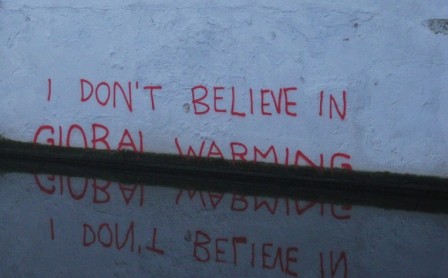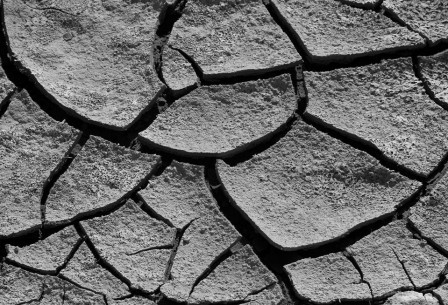Climate Of Hate: The Politics Of Climate Change Denial

NEWS JUNKIE POST
Apr 12, 2010 at 10:23 amAs HateWatch notes, according to posters at the white supremicist site StormFront the “global warming scam” is a jewish plot . That’s right, it’s all part of the vast Zionist conspiracy. They even identify a number of prominent climate scientists and policy shapers as Jews (what more evidence do you need?). Small wonder then that the racist British National Party has made exposing “the scam” one of it’s central platforms.
Two points I’d like to make about this: i) it underscores the reality that climate change is a progressive issue on a par with any other, and not, as some progressives tend to see it, as some sort of middle class environmental concern separate from ‘real issues’, and ii) climate change is a political struggle just like any other, and not, as some environmentalists tend to see it, a matter purely about education and information.
On the one hand it is no real surprise nor something particularly unique. The whole tea-bagger revolution is a reaction of a predominantly less educated group who is afraid and insecure. They see their prospects declining and they don’t know what to do about it. Their fear and anger manifests as lashing out against every disenfranchised group there is, from women to gays to people of colour. What the issue or facts are is irrelevant.
Climate change is a perfect issue for this “culture war” in that it is coming from the educated class (read “elite”) and is too complex for Joe the Plumber to grasp in a 20 sec sound bite. It involves many of the bogey men that the reactionaries fear, from taxes to regulation to increased government infrastructure.
Further, the first and worst victims of climate change will be the disenfranchised, while the privileged class has the most to lose in the short term. Best of all, it can all be explained and dismissed as a Progressive conspiracy to seize power and create a monolithic World Government.; the ideal recipe for a radical right reaction.
Unfortunately environmentalists and scientists have been approaching the climate change issue as though it were simply a matter of insufficient knowledge on the part of the general public; what Naomi Oreskes refers to as the “information deficit model.” Since the problem is understood as there not being sufficient information, the ‘solution’ is obviously to provide more information. Polls tell us this is not working, as Oreskes discusses in these videos:
Beyond Belief 2008 -09
As Oreskes notes, 29% of the general public deny that global warming is even happening at all, and she suggests that it is the same 29% who believe Saddam Hussien attacked the US on 9/11. She is probably right. To a certain extent the Islamophobes are also climate change Deniers, and share most of the rest of the right wing agenda as well.
It is not so much that education is the wrong approach as that it is insufficient. We do need to be doing the public education, but we need to be doing other things as well. The struggle is a political one and we forget that at our peril. As everyone should know, the Deniers respond to the debunking of one ludicrous fable simply by invoking another one. Once someone has embraced mindless delusion they tend to do so wholeheartedly.
The issue is partially that of knowledge, and certainly some proportion of those who are unclear as to what the truth is are open to rational discussion of the facts. However, the main things driving the reactionary right, at least at a populist level, is fear and helplessness.
In the same “through the looking glass” reversal as I described in “Orwell 2.0“, Michael Crichton’s “State of Fear” (a climate Denier “must read”) portrays an Orwellian world where skeptical scientists are intimidated and their research suppressed. Here again the fact is that while it is true that fear is a principle tool in climate politics, it is the Deniers who are using it to rally those who are fearful.
People will not be open to being educated about climate issues while they are frightened. The work we do needs to recognize that and include facts that address people’s fears. Education about economic opportunities in the clean energy sector is a good example of something that addresses people’s sense of economic insecurity. Although we hardly needed more work, the fact is that we have to be aware of and address people’s real motivations rather than what we think their motives should be.
If right wing reaction has spilled over into climate issues, the obverse will also be true. As the climate crisis deepens we will get more and more people who are frightened, insecure and feel helpless. A healthy proportion of them will take refuge in the hate mongers camp where they will necessarily embrace the full spectrum of Regressive politics.
As I discussed in ‘The Many are One” we are all dealing with different manifestations of the same issue and our work needs to reflect that at all levels. Recently a dear friend who is also a radical gay activist made a climate change joke, and as gently as possible I called him on it. His reaction was to tell me to “lighten up.” My response was to ask what if I had made a gay bashing joke which he would quite rightly have called me on, and I had replied “lighten up.” Feels different, doesn’t it?
But if the broader Progressive community needs to take climate more seriously, the environmental movement needs to integrate the full range of progressive issues far more than it has. Far too many environmental groups still seem more like nature appreciation societies rather than progressive political activists. It is incoherent to talk about the grand inter-connectedness of nature while ignoring the social, political and economic inter-connectedness of our issues.
From sealing to forest issues environmentalists have repeatedly found themselves at odds with what should be our natural allies, such as First Nations and labour. Unless we change our approach these conflicts are simply going to become more common and intractable. In proposing ‘solutions’ we have to recognize the concerns and aspirations of the various affected communities and address them in a serious way. We also need to educate our own communities about the political and social aspects of our issues, not merely the scientific ones.
No progressive issue is going to fare well in a climate of hate and fear; to succeed we must create a climate of acceptance and hope. Each sector of the progressive community brings experience and resources to the struggle. We can share those and use them to our common benefit by acting as one resistance community, or we can continue to harbour the delusion that our own particular issue is somehow special and unique relative to the rest. That’s something we decide, not them.
Lightening up: “StormFront is for Dummies” from JudeophobeWatch
Related Articles
- March 15, 2010 Environmental Politics and The False Muddle
- April 5, 2010 Climate Change Denial: The Smoking Gun
- August 16, 2010 With Your Fierce Tears: Rage, Rage Against The Dying Of The Light
- May 3, 2010 Environmental Politics: Agitate Or Cooperate?
- May 10, 2010 Do I Make A Difference? Never Send To Know …
- March 29, 2010 Earth Hour Ambivalence Or Not















3 Responses to Climate Of Hate: The Politics Of Climate Change Denial
You must be logged in to post a comment Login